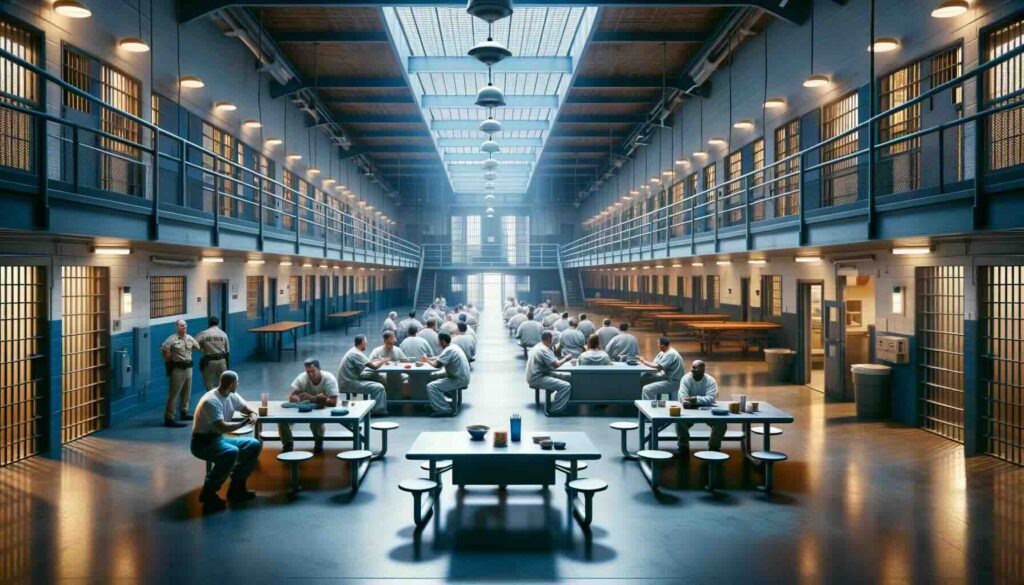Physical Address
304 North Cardinal St.
Dorchester Center, MA 02124
Physical Address
304 North Cardinal St.
Dorchester Center, MA 02124

Imagine stepping willingly into a place where the clank of metal doors and the whisper of hushed conversations set a tone of relentless uncertainty. This isn’t fiction; it’s the stark reality of those who participate in A&E‘s groundbreaking series. Reflecting on my own nerves when facing the unknown, I empathize deeply with the brave souls of 60 days in season 7, as they don undercover identities, returning to a life once left behind. Watching from the safety of my home, the vulnerability of these volunteers reminds me of the thin line between spectator and participant. This season, we’re not just watching; we’re immersed into a world where every moment is visceral, real-life drama.
In the harrowing corridors of Henry County Jail, Georgia, each episode peels away the veneer of assumptions we hold about incarceration. Here, the inmates and volunteers, including former prisoners, are placed back within walls that echo with stories both told and untold. They are part of an undercover program designed to shed light on the darkest corners of human resilience. So, as I settle in to watch 60 days, it’s with a profound respect for these individuals who face their fears head-on, and the thoughtful contemplation of what it truly means to step into the shoes of another.

Imagine stepping back into a world you vowed never to return to. That’s the groundbreaking twist in Season 7 of “60 Days In,” where a new breed of participants, including former inmates, are handpicked by Sheriff Scandrett and his team to infiltrate the Henry County Jail. These courageous volunteers merge with the general population for 60 days, their identities shrouded in secrecy as they delve into the gripping life behind bars.
This season, quarantine pods take a serious turn as pivotal centres of action. The once nondescript parts of confinement evolve into hotbeds for drama and unprecedented strain due to COVID-19 regulations. Can you imagine the tension? Within these restricted quarters, explosive arguments erupt within the walls, challenging not just the mettle of these stout-hearted few, but also the very fabric of trust they must weave with other inmates.
It’s one thing to serve time, it’s another to choose it. In Season 7, these participants are doing just that, bringing an intense dedication to reforming a system they once lived through. Their mission? To unearth truths only those within can truly reveal. It’s a mission that I, personally, can’t wait to follow.
The participants of “60 Days In” dwell at the crossroads of courage and vulnerability. They are walking into the lion’s den, bypassing guards and administration, going undercover, and coming face to face with reality. Will their resolve hold? Can they effect change from the inside? One thing is certain, the journey these individuals are on is unlike anything we’ve seen before, and their stories promise to be as raw as they are revealing.
Embarking on another daring foray into the unseen life behind bars, the latest season of “60 Days In” introduces us to a cohort of former inmates and innocent volunteers with the fortitude to live among the general population of Henry County Jail. Under the watchful eye of Sheriff Reginald Scandrett, who faces the daunting challenge of improving jail conditions, these individuals offer us a candid glimpse into a world most would never dare to tread.

Season 7’s selection of participants comes with an impressive, albeit intimidating, dossier. With over four decades of combined time already spent in cells, characters such as Carlos, Jojo, and Tangie step back inside, this time armed with the purpose to shed light on the darkness within the jail’s operations. Their unique insights serve as a powerful tool to pinpoint inefficiencies and illicit dealings from an inner perspective, a profound advantage over outsiders. I am keen to see how these intense inmates, with their distinctly diverse life stories, will weather the storm of returning to a society that once deemed them unworthy.
Not strangers to the undercurrents of a facility fraught with tension and danger, our intrepid volunteers now face a litany of new trials. The journey to assimilate with the general population proves treacherous, as they must shield themselves from unwanted attention and navigate the murky waters of inmate hierarchy. Situations like the flooded pod and the handling of dirty laundry pose a serious threat not just to their mission, but their personal safety. The layers of risk enveloping their daily existence are a stark reminder of the stark realities that come with confinement—realities that these brave souls are willing to endure once more.
As I stepped into the Henry County jail, the reality of the new norms in confinement quickly unfolded before my eyes. Entering the quarantine pods, a jarring shift from the outside world to the inside, laid bare conditions that were more grueling than I had braced myself for.
The areas designed for quarantine, meant to keep inhabitants health-conscious, ironically played host to challenges that tested both physical and psychological limits. These conditions of the quarantine pods at Henry County jail weren’t just spaces enclosed by walls and bars; they were realms that seemingly slowed time, heightening senses and anticipation.
The stark reality of witnessing medical emergencies up close, in a space where instant decisions make the difference, was sobering. Observing the slow response times from the staff was not just a lesson in patience, but a hard-hitting enlightenment into the psychological toll these confines impart on the people within.
It is within these constraints that I learned resilience carries a different weight behind the thick glass and steel doors of the quarantine pods. Here, true grit is not just enduring, but standing apace with the slow tick of a clock that seems, at times, to have forgotten to move forward.

Embarking on an undercover program within the confines of jail walls demands a unique blend of savvy and resilience. This season, as I delve into the intricate world carved by the prison mentality, I witness firsthand how the lines between an inmate or civilian blur, offering a vivid glimpse into the adaptations necessary to navigate this underground society. Undercover inmates, equipped with knowledge from their previous criminal lives, adeptly slip into the roles expected of them, all to gather insights that only those on the inside could understand.
My encounter with this world introduces me to varied tactics that reverberate with ingenuity. Participants, striving to gel seamlessly with their fellow inmates, initiate small economies, fashioning makeshift “stores” that win them favor and status—a currency more valuable than cash within these walls. They become knights in grimy armor for the young and vulnerable, mentoring them in what could be seen as an act of redemption or strategy. Even as a so-called “pod boss” emerges, their objective remains cloaked in secrecy, their true identities shrouded, their motives perpetual mysteries to those they walk among.
Despite the stark absence of details on upgraded surveillance technology, one can surmise its critical role in the production. Advanced surveillance becomes the linchpin in ensuring the safety of undercover participants as they intertwine their lives with those serving real time. These eyes in the sky, the silent sentinels, are tasked to meticulously monitor interactions, capturing the truth in unguarded moments and validating the veracity of the intelligence gathered—a true marriage of strategy and technology.
My viewing experience of 60 Days In has consistently sparked significant cultural conversation, often becoming the centerpiece of debates on contemporary justice and ethical entertainment. The latest season was no exception, bringing forth heated discussions that echoed long after each episode’s conclusion. Particularly during the “Aftermath” episodes, I watched as participants boldly confronted aftermath sheriffs with accusations about the harsh realities they faced while undercover. Their raw, sometimes emotional testimonials, illustrate the inherent difficulties in blending high-pressure environments with high-quality content.
It’s the explosive arguments and unfiltered exchanges between the volunteer inmates and Sheriff Scandrett that have truly questioned the boundaries of documentary storytelling. These intense moments of truth, stretching the fabric of how reality TV portrays the penal system, are pivotal in shaping the narrative and challenging viewers’ perceptions. They draw a thin, taut line between drama and documentary, ensuring this provocative series remains etched in the minds of its audience.
As I reflect on the impact of these televised confrontations, I can’t help but grapple with the ethical implications of exposing such raw human emotions for the world to critique. It’s within these candid moments that the show achieves its goal of shedding light on the hidden corners of incarceration, a feat that’s as commendable as it is controversial.

As I delve into the seventh season of 60 Days In, I can’t help but reflect on the intense psychological impact this experience has on its participants. Immersed in the day-to-day stress and the volatile environment of Henry County Jail, it’s clear that volunteers in the series face significant emotional turmoil. Being within the walls of the jail thrusts them back into confrontations with their past, challenging their mental resilience as they grapple with the complexities of incarceration once more.
It becomes apparent as episodes unfold that many participants wrestle with the emotional toll of their roles. Behavioral changes begin to manifest subtly at first—hesitations in decision-making, or a quick flash of frustration—then more pronounced as the days press on. One can see the weight of the mental health challenges they endure, all while under the constant gaze of cameras and an international audience. It’s a powerful demonstration of just how deeply our psyche can be affected by the pressures of an environment designed to isolate and monitor every move a person makes.
While 60 Days In serves to highlight the real-life issues within the correctional system, it undeniably also casts a spotlight on the psychological wellbeing of those brave enough to enter its fold. Whether it’s moments of despair or instances of newfound strength, the series provides a raw look into the deep-seated effects of the criminal justice system on the human spirit.
“Confronting not only the fears of re-incarceration but the haunting memories that come with it, each participant’s journey serves as a poignant reminder of the indelible psychological imprint that a brush with the law leaves on an individual.”
Through observing these courageous individuals, my understanding has deepened regarding the complex interplay between societal structures like jails and the mental health of those within them. The series does more than just entertain—it sparks a crucial discourse on the necessary support systems that should be in place for those who exit such a reality, and the ongoing impacts that such an experience can imprint on one’s mental landscape.
When I settled in to watch Season 7 of “60 Days In,” I was bracing myself for the usual suspense and grit associated with the series, but nothing could have prepared me for the unexpected twists and shocking moments that unfolded. From the explosive arguments to the stealthy shakedowns, this season truly pushed the envelope, showcasing some of the most intense scrutiny the show has witnessed yet.
The unpredictability of “60 Days In” always keeps me on my toes, but the reveals this season had me gasping in disbelief. Picture it—you think you’ve seen it all and then, a participant uncovers a clandestine drug operation right under the noses of the jail staff. On several occasions, the shakedowns had me and many viewers glued to our screens, wondering if the participants’ cover would be blown. Each episode felt like wandering through a maze, where any turn could lead to an unforeseen revelation.
Conversely, it’s the quiet before the storm in those speechless moments that linger with you long after the show ends. The raw reality hit hard when a simple dispute swiftly escalated into a full-fledged brawl in the women’s pod. It’s these instances where the true-to-life nature of “60 Days In” shines, placing us as spectators in the center of the chaos. It never failed to surprise me just how quickly tensions could ignite, turning a seemingly tranquil situation into one of this season’s highlights – the kind you watch with bated breath.
Amidst all of these electrifying scenarios, it’s critical to remember that what we’re witnessing is someone’s reality. The profound impact these moments have on participants and viewers alike is a testament to the program’s influence – it is so much more than mere entertainment. As I recount the season’s high-stakes journey, these harrowing experiences reinforce the program’s powerful exploration of life behind bars and its steadfast pursuit to give an uncensored look at the trials faced within the walls of Henry County Jail.
As I tuned in to the latest season of 60 Days In, I witnessed an inmate’s journey that was both stirring and revelatory. The compelling “Never Going Back” episode was especially impactful, as it provided an intimate look at Carlos’s emotional realization of his early release. He, among others, embarked on this path not just as former inmates but as crucial contributors to a mission filled with transformational moments.
The poignant narratives culminated in an intense debrief, where each participant recounted their experiences within the confines of the Henry County Jail. This critical session with Sheriff Scandrett was more than just procedure; it was the aftermath of an odyssey that reshaped perspectives. This debriefing wasn’t merely about sharing insights—it was a raw testament to the fortitude and adaptability of those determined to bring about change.
Amidst the highs and lows, one participant stood out—Darius, whose efforts to bring harmony to the pod spoke volumes about the power of leadership and empathy in the most challenging environments. His dedication to mediating peace exemplified the ideal that one should ‘Be the change you want to see in the world’.
For each participant, the pledge of ‘never going back’ was more than a promise to self; it symbolized a deep commitment to progress, learning, and importantly, to contributing to a system in dire need of reform.
As a journalist passionate about the intersection of entertainment and reality, I delved into the creation process of 60 Days In Season 7, a season that was unique not just in content but in its making amidst global upheaval. The production challenges brought on by COVID turned the usual demands of filming on its head, compelling the team to reimagine the making of season 7 through a different lens.
The arrival of the pandemic demanded quick adaptation and innovative problem-solving strategies. Narratives were disrupted, filming schedules shifted, and the health protocols became as stringent as the security measures the show is known for. The necessity for quarantines and social distancing introduced new dynamics within the cast and crew, revealing the intricacies behind our commitment to raw programming that captures the truth of incarceration.
“Every season challenges us to delve deeper into the realities of jail life, but this was something else,” said one of the producers, highlighting the unprecedented nature of producing a season like this. It was the directors’ perspectives, paired with the producers’ insights, that shaped the narrative of Season 7. “Our vision has always been to present the unvarnished truth, and that became both a challenge and an imperative during the pandemic,” the director added. This shared ethos fueled their mission to offer an insider view rarely available to the outside world.
In exploring the behind-the-scenes efforts of the show, I’ve come to see the array of complexities that comprise the crafting of such an impactful series. It reinforces my belief that television can be more than just entertainment—it can be a powerful mirror reflecting the toughest parts of our society.
As I delve into the world of 60 Days In, I often find myself reflecting on the justice system insights imparted by law enforcement professionals. The expert opinions offered by those in the field can be an illuminating complement to the series’ depiction of life behind bars. These seasoned officers provide a wealth of knowledge that digs deep into the systemic challenges and inherent complexities faced by facilities like Henry County Jail.
It’s no secret that reality television can sometimes skate on the surface of sensationalism, but with 60 Days In, the show commands a unique sense of respect among law enforcement circles. You see, the series doesn’t just entertain; it resonates with the real-life scenarios officers confront daily. Speaking with police officers and correctional staff, I’ve gleaned that the show’s portrayal of incarceration isn’t far off the mark from what actually transpires within the cinderblock walls.
Engagement with the complex dynamics of our justice system is crucial, and 60 Days In opens an important dialogue. Through the lens of the undercover volunteers, we see a candid narrative that many of us in law enforcement find exceptionally valuable.
This type of dialogue is what brings the authentic experiences of justice system operatives to the forefront. The difficulties encountered by volunteers mirror the challenges we wrestle with every day, making this show a startlingly true-to-life stage where the drama of incarceration plays out.
Indeed, the convergence of expert opinions, justice-system-derived narratives, and raw, firsthand experience establishes 60 Days In as not just a source of entertainment, but as a compelling study and reflection of the nuanced realities law enforcement professionals face.
As someone with a keen eye on documentary series, I’ve been closely monitoring the viewers reactions to Season 7 of “60 Days In.” It’s fascinating to see how a series can simultaneously captivate and polarize its audience. The series ratings have been a mixed bag, with many praising the show’s unflinching look at life behind bars and others questioning the morality of such a voyeuristic endeavor.
Engaging with the critical reviews has been particularly enlightening. Critics often discuss the program’s contribution to socio-political conversations concerning the justice system. What’s more, the audience engagement cannot be understated. Forums and social media are abuzz with debates, reflecting the power of “60 Days In” to ignite public discourse. It’s clear that the show doesn’t just entertain; it also challenges its viewers to think more deeply about the world around them.
One viewer wrote, “Season 7 has been a rollercoaster of emotions. It’s raw, real, and at times, really uncomfortable. But it’s important viewing for anyone interested in the state of American justice.”
The diversity of opinions is undoubtedly a testament to the show’s ability to engage viewers, whether they’re in it for the gripping content or the ethical discussions that arise. As a journalist, my fascination lies not only in the content of the show but also in the reactions it invokes; it’s a powerful reminder of the influence that reality television can have on public perception and dialogue.
The 60 days in Season 7 journey revealed a transformative narrative that captivated my attention from start to finish. Witnessing law-abiding citizens dive into the concealed world of correctional facilities as part of a bold undercover operation not only engaged me but also sparked critical thought about our justice system. This season did not shy away from the harsh realities incarcerated individuals endure, nor the psychological and emotional repercussions the participants and their counterparts must manage daily.
It was an eye-opening expedition, one that brought the stark contrasts between life inside and outside the walls into the spotlight. By living amongst those they were surveilling, the brave volunteers supplied viewers like me with invaluable incarceration insights. Their experiences call attention to the necessity of strategies aimed at cutting down recidivism, accentuating the imperative for reforms that honor human dignity while maintaining public safety.
As a proponent for change, I must acknowledge the cultural and societal impact this powerful series creates. It’s not every day one sees such a vivid intertwining of entertainment with advocacy. “60 Days In” season 7 did more than just show; it demonstrated that understanding and empathy can stem from the most unlikely of environments, proving transformative for everyone involved. Here’s to hoping these revelations are but the starting point for meaningful conversations and, ultimately, progressive transformations within our criminal justice system.
Season 7 of 60 Days In takes viewers deeper into the reality of incarceration, offering an unprecedented look at life behind bars with a new batch of innocent volunteers sent to live among the general population for 60 days without officers or the jail staff knowing their true identity. This season, Sheriff Scandrett and his team face formidable challenges as they navigate the volatile environment of the jail, aiming to uncover hidden flaws and improve the system from within.
As the first participants move to general population, they must form bonds with new inmates, navigate the hierarchy of jail life, and avoid drawing unwanted attention—all while gathering crucial information for Sheriff Scandrett. The intense conditions of the quarantine pods take a serious toll on the participants, testing their mental and physical limits. Soledad O’Brien hosts a reunion where participants press Sheriff Scandrett on the difficult conditions they endured and discuss the highs and lows of their experiences. An appearance by Shaquille O’Neal adds an unexpected twist, further highlighting the show’s impact on raising awareness about the realities of the penal system.
60 Days In Season 7 proves to be no walk in the park, as new breed of participants encounter unprecedented challenges in Sheriff Scandrett’s jail, from COVID restrictions to dealing with intense inmates and navigating the politics of general population. This season is a compelling exploration of the complexities of incarceration, offering insights into the courage and resilience required to survive behind bars.
For those intrigued by gripping, real-life drama, Prime Video offers a platform to watch this season along with a diverse range of content, including Love & Hip Hop Atlanta Season 11 (https://showspulse.com/love-hip-hop-atlanta-season-11/), Family Guy Season 21 (https://showspulse.com/family-guy-season-21/), and All the Queen’s Men Season 3 (https://showspulse.com/all-the-queens-men-season-3/), catering to a wide range of entertainment preferences.
Season 7 of “60 Days In” is available to watch on A&E, and streaming access is also offered on platforms like Hulu.
Unlike previous seasons, Season 7 incorporates former inmates as volunteers who go undercover, delivering a new perspective on life behind bars under the guidance of Sheriff Reginald B. Scandrett and his team.
The participants in Season 7 are a mix of former inmates, chosen for their unique experiences and backgrounds, including Carlos, Jojo, Dontae, Rojonah, Nick, Tangie, and Chucky.
Participants encounter the difficulties of jail life such as establishing their position within the inmate hierarchy, managing unwanted attention, and dealing with issues like flooded pods and navigating the conditions of the quarantine pods.
COVID-19 introduced new challenges for the show’s cast and crew, impacting interactions among participants, daily operations, and necessitating additional health and safety measures during the show’s production.
Season 7 is filled with shocking moments, including intense confrontations, covert drug transactions, and unanticipated twists that significantly impact both the participants and viewers.
The intense environment and psychological strain of undercover jail time have led to significant emotional tolls, behavioral changes, and mental health challenges for the participants.
Yes, in the Aftermath episodes, participants press Sheriff Scandrett and his team about the strenuous and sometimes dangerous conditions they endured during their time in the program, leading to explosive arguments.
Law enforcement professionals provide expert opinions that highlight the operational challenges and complexities of the justice system as portrayed through the experiences of the show’s participants.
The audience reactions to Season 7 have been mixed, with some praising its authentic portrayal of incarceration and others questioning the ethical implications of the premise, which has sparked a broad range of discussions.